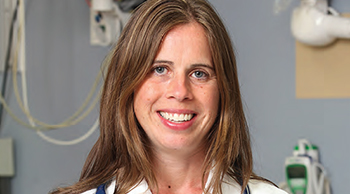-
Services
Featured Specialties
-
Locations
Location Type
-
Patients & Visitors

An interview with Darcy Harris, DO, associate chair, Emergency Medicine, Bridgeport Hospital
Q: How do you know when to seek care at a hospital emergency room (ER), urgent care center or from your primary care provider (PCP)?
Most PCPs can manage chronic conditions, such as back pain, depression, high blood pressure and diabetes and will partner with the patient in ongoing health maintenance, like an annual physical. PCPs also treat acute conditions, such as upper respiratory illness, rashes, urinary tract infections or muscle strains/sprains.
Q: What types of illnesses or injuries can be treated at urgent care/walk-in centers?
Urgent care/walk-in centers are good for typically healthy patients who cannot schedule a timely sick visit with their PCP. Coughs, congestion, body aches, sore throat and flu-like symptoms can be checked at urgent care centers.
Rashes with no trouble breathing and simple cuts and sprains are also appropriate for urgent care. For minor illnesses in children, try your pediatrician first. Pediatric offices tend to have more sick visits than PCPs do. Elderly patients with multiple medical conditions or more acute symptoms or injuries should seek care in an ER.
Q: When should you call 911 and get to an ER?
With chest pain, trouble breathing and uncontrolled bleeding, go to the ER. Go to the ER for other conditions such as head injuries, serious injuries or cuts, fainting, asthma attacks, abdominal pain, ongoing vomiting and diarrhea, high fever, allergic reactions, shortness of breath, acute headache, speech difficulty, rapid change in or painful vision, and weakness or numbness of the arms, legs or face. You might need to go by ambulance. If you are unsure, call 911.
Q: How do you know which centers accept your insurance?
Many urgent care centers have a flat rate, similar to a copay at a PCP. They usually make patients aware of the fee upon arrival. If you are uncertain whether your insurance will be accepted, it is best to call ahead. It may also help to call your insurer to clarify your plan options.
Yale New Haven Health recently partnered with Physician One Urgent Care, the first physician-owned urgent care center in Connecticut certified and accredited by the Urgent Care Association of America. Yale New Haven Health also owns and operates the Fairfield Urgent Care Center, which is staffed by board-certified physicians.
These facilities have ancillary services such as X-ray and basic lab testing and are dedicated to high-quality, safe, efficient care.